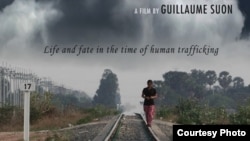As human trafficking makes world news headlines, experts at a documentary screening discuss how poverty, vulnerability, and corruption are the root cause.
“The Storm Makers” documentary illustrates how young women in rural Cambodia are lured into slavery. At a recent screening in Washington, human trafficking experts explained how poverty is the driving force for people to fall into slavery.
Terry FitzPatrick, communications director of Free the Slaves, says that in a country where the economic options are not compatible with the population, people have to migrate for work outside their community.
“So we hear that the population in Cambodia has grown dramatically, but the economy of Cambodia has not kept up,” he said. “So that means people must leave to go find work somewhere, and that makes them vulnerable in this migration situation.”
In “The Storm Makers,” we hear the story of Aya, who was 16 year old when she was persuaded by her mother to apply for work in Malaysia. She was physically abused and exploited. In her attempt to avoid the abuses from her boss, Aya was raped and eventually detained, until she could return home.
According to Free the Slaves, some 36 million people worldwide are trafficked for labor and sex each year.
What makes people in a country vulnerable to slavery and human trafficking are weak labor laws, FitzPartrick said. As manufacturing jobs move from countries with strong labor laws to those with weaker laws, “a lot of factory slavery” ensues, he said.
Corruption is also a barrier for the effective labor migration policies that help stop trafficking, Sara Colm, a former Cambodian-based researcher for Human Rights Watch, said.
“We can observe that Cambodia remains a very poor country with a low level of training and education, so that implementation can be difficult,” she said. “More importantly, it’s just the widespread corruption.”
A corrupt government can make slavery possible in many ways, she said. “When it’s a very big business like trafficking, it’s really a lot of money. There are a lot of levels of collusion between illegal businesses of human trafficking and officials.”
To end slavery, FitzPartrick believes that economic opportunity needs strengthened and that people need more awareness about their rights.
“Community matters,” he said. “When you work at the community level to help create saving clubs, microfinance, and help work on educating girls, you help work on resilience of everyone in that community.”
Media can bring a lot of attention to the issue, and that helps with intervention, Colm said. “One thing I think is really important is media coverage of the problem, because the problem here is often invisible. Men who are at sea, who can get to see them? They are invisible.”







